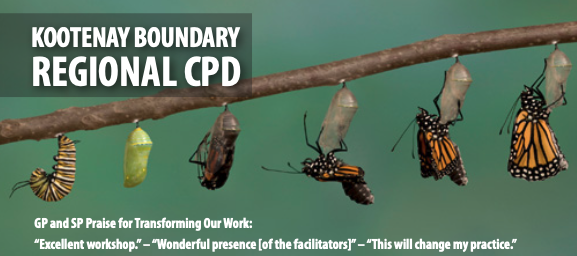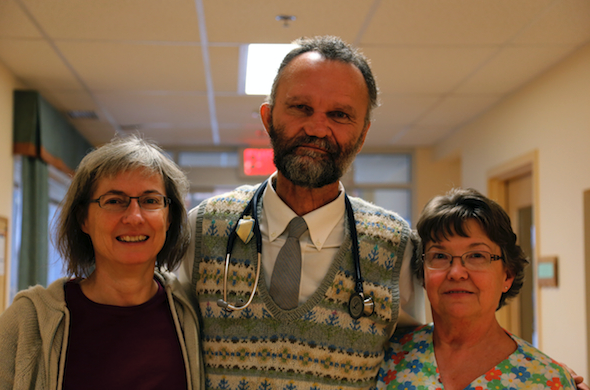Latest News & Events
Click here to see our KB Division Dispatches and learn more about what's happening in the region.
Kootenay Boundary Virtual ICU Project Featured in National Publication
Digital Health Canada’s ‘Virtual Care in Canada: Snapshots of Innovative Virtual Care’ showcases virtual care success across Canada. The publication features 10 case studies highlighting innovative projects from coast to coast, including the Kootenay Boundary’s own Virtual ICU project!
The overarching goal of the KB Virtual ICU project is to provide tele-mentoring decision support for critical care cases, provide access to specialist care, and build collaborative care teams.
In our region 12 small communities are linked to the regional ICU site in Trail. In our small ERs around the region, it was clear that a virtual solution to connect clinicians for critical patient care would both support clinicians with the difficulties posed by the rural settings such as access to consultation and mentorship, while improving patient outcomes and reducing need for transportation.
The chosen solution was to create a virtual ICU tapped into existing mobile video carts in six locations, with standards-based video conferencing software. The mobile carts are moved to the trauma rooms and specialists remotely connect through a desktop version of the software on their desktop, laptop, or phone.
So far, the virtual ICU model has allowed for telementorship, recruitment and retention support of rural family physicians, skills enhancement for future cases by creating a virtual multi-disciplinary team, and collaborative care planning for patients between primary and specialist care teams.
Check out the Kootenay Boundary Virtual ICU Case Study Here >>
Check out the complete Virtual Care in Canada publication >>
Kootenay Boundary Wellness Project supports good mental health for doctors
Doctors around the province are constantly working to balance patient care, office management, and an increasing volume of paperwork, with their personal lives and family obligations. It’s become more important than ever to ensure that physicians feel connected, and that they are armed with skills to deal with difficult situations.
Recognizing this, the Kootenay Boundary Division of Family Practice initiated the KB Wellness Project in 2018—a program that focuses on ensuring division members have access to peer-to-peer connections in their communities. Organizing space for physician connection and arming members with skills to deal with difficult situations means doctors feel supported in maintaining their mental health as they manage their busy workloads.
 Dr Todd Kettner, Project Manager, explains how the program, called “Unplugged for Wellness,” works towards two fundamental goals. “The first [goal] is to reduce stigma around mental health issues for physicians by opening up conversations,” he says. “And the second is to facilitate meaningful connections between doctors.”
Dr Todd Kettner, Project Manager, explains how the program, called “Unplugged for Wellness,” works towards two fundamental goals. “The first [goal] is to reduce stigma around mental health issues for physicians by opening up conversations,” he says. “And the second is to facilitate meaningful connections between doctors.”
It can be difficult to try and squeeze these events into doctors’ already full calendars. But as the Kootenay Boundary Wellness team has found through their evaluation research, even just knowing that these events are available is a source of encouragement to physicians.
“Though some doctors may not be able or want to attend a certain event, they still feel the positive effects that these events represent,” says Dr Kettner. “And the fact that these events are brought to smaller communities across the division makes doctors feel that there is a real effort to accommodate everyone regardless of their location.”
Events have included informal coffee meet-ups, outdoor excursions, guest speakers, and guided weekend retreats. The events that have garnered the most positive feedback are the focused learning events. But as Dr Kettner points out, the success of these events lies in the combination of practical advice and open discussion space.
“We’ve found that the purely ‘for fun’ events don’t have the same interest and impact as the learning events,” he says. “It works to draw participants in with a cerebral objective and then give space for the natural cross-talk and bonding to happen.”
Other considerations that are key to successful events include scheduling 3-4 months in advance, providing iterative feedback to members, and not overscheduling events (which can cause additional stress to the already overloaded physician).
Transforming Our Work retreats: Creating space for open dialogue
As physicians, Drs Tandi Wilkinson and Lee-Anne Laverty are passionate about physician mental health and wellness. As certified yoga teachers, they have seen the positive effects that yoga, meditation, and open discussion can have on maintaining good mental health. Combining their unique skill sets, Drs Wilkinson and Laverty host Transforming Our Work, a series of wellness retreats for specialist and family physicians across the Kootenay Boundary region.

To date, Drs Wilkinson and Laverty have received positive feedback about the retreats. Using principles of transformation from yoga, and coupled with inquiry, participants are empowered to focus on difficult issues in a safe, supportive atmosphere. The philosophy is simple: create a safe space for dialogue to arise naturally.
“We don’t need more evidence,” Dr Wilkinson says. “We need to move past talking about the facts and the data, or even talking about the solutions.”
And doctors who participated in the retreats are echoing this desire for less time spent listening and more time sharing. As one physician writes, “I’ve listened to a lot of talks about physician wellness, and it’s so fundamentally different to listen to someone talk compared to actually having to practice these things. Having these hard conversations, sharing things, and crying in front of people; all of those things are so much more powerful than just listening.”
As a way to extend this philosophy beyond the two-day sanctuary of the retreat, Drs Wilkinson and Laverty introduce the doctors to the idea of “failure friends.” A failure friend is a concept that Dr Wilkinson was inspired to explore after learning about it from Dr Sarah Grey, internist and medical educator from Toronto. During the vulnerable period of time after experiencing a perceived failure, it’s pivotal for doctors to have peer support. A failure friend is a fellow physician to whom another physician can reach out to express feelings of failure, frustration, or disappointment. The failure friend’s role is to listen without fixing, normalize the experience, and provide empathic support.
“In our workshop we practice the roles in a failure friends relationship,” says Dr Wilkinson. “The focus of our workshop is not to talk about things but to put them into action.”
The failure friends concept is an actionable takeaway from the retreat that doctors can use in their day-to-day life. And many participants do. “Failure friends help illuminate what you’re thinking and how to be self-emphatic and work forward from there,” reports a physician. “I think the failure friend concept is an essential part of doing the work.”
Continuing the research
Dr Wilkinson’s work in rural family practice and emergency medicine is coupled with her research into physician wellness. She was recently awarded a Rural Scholar Research Grant through UBC’s Department of Family Practice, and is currently involved in a qualitative study on physician peer support. Having discovered that doctors first look to their peers for support during difficult times, Dr Wilkinson believes that giving and receiving support is a win-win situation for doctors.
“When you take away the stress of having to ‘fix’ your colleague, and just recognize that it’s normal to feel pain in response to difficult situations, it is quite liberating to just listen and provide support,” she says. “It is actually one of the reasons most of us go into medicine – to make a difference.” Her early research suggests that simply hearing that these difficult experiences are normal, and that we may be doing better than we think, plays a significant role in retention.
Through member feedback and research, the iterative process that Kootenay Boundary Division applies will ensure that the events they host will make a positive impact on their physician members, and the community at large.
Health Care Teams Work Side By Side Improving Residential Care
 In late spring, a group of 36 physicians, residential care facility managers & providers, nurses and Interior Health administrators from nine residential care facilities across seven Kootenay Boundary communities came together for the first ever residential care regional quality improvement meeting.
In late spring, a group of 36 physicians, residential care facility managers & providers, nurses and Interior Health administrators from nine residential care facilities across seven Kootenay Boundary communities came together for the first ever residential care regional quality improvement meeting.
The meeting is the brainchild of Dr. Trevor Janz, Physician Lead of residential care for the Kootenay
Boundary Division. "We know that great ideas come when the full team is together," said Dr. Janz. "Quality improvement meetings bring care teams together at the region-wide level, and use statistics and data to compare our facilities with each other, Interior Health as a whole, and the provincial averages. Armed with this information, we can work together, sharing leading practices, ideas for dealing with specific challenges and continuously improving the care we give."
Comparing facilities could be a vulnerable subject for some, but Dr. Janz's non-confrontational approach puts the group at ease. Linda Golds, Residential Care Coordinator at Minto House in Nakusp said, "Trevor presents the information in a totally non-judgemental way, the feeling you get is that we are an extended family, taking an honest look at how things are and discussing how we can do things better, together."
The meeting focused on nine indicators including things like 'residents admitted as in-patients', ‘residents on nine or more medications’ and ‘physician 24/7 availability and on-site attendance’. These indicators were then discussed in the context of moving toward the five best practice expectations set by the FPSC:
- 24/7 availability and on-site attendance when required
- Proactive visits to residents
- Meaningful medication reviews
- Completed documentation
- Attendance at case conferences
Cindy Kozak-Campbell, Executive Director Residential Services for IH said, "What struck me the most was that we had the full collaborative team in the room, physicians, site managers, nurses, Interior Health administrators and private partner site leaders. For residential care, it is the full team that impacts quality outcomes.
With everyone at the table, we have all the perspectives and can come up with new ideas and solutions to challenges that work for everybody in the team."
"There is an element of 'friendly competition'," adds Dr. David Merry, a GP providing residential care services in Christina Lake. "Personally, when I see another facility or physician doing it better, it motivates me to find out what they are doing differently and not only change it in our own practice/facility but see how we can even go one step further than they have. That is what continuous improvement is all about."
Following the meeting 94% of attendees said they would change their approach to practice, including: implementing ideas from the meeting to support ongoing efforts to reduce medications, shifting the culture of care from a medical management to more of a residential care model, increasing communication with the full team including regular discussions with staff regarding root causes of behaviours and planning more educational events regarding best practices in residential care vs. guidelines-based care.
Ms. Kozak-Campbell added, "In 20 years of working in residential care, this is the most collaborative approach I've been involved in and this event really illustrated the shift that is happening with team based care. Dr. Janz models a people- and resident-centred approach which inspires the whole care team to continually strive to improve."


